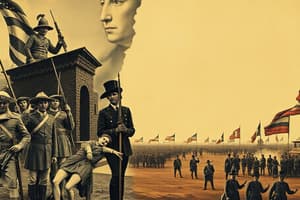Podcast
Questions and Answers
What was a primary economic concern of the colonists regarding the Stamp Act?
What was a primary economic concern of the colonists regarding the Stamp Act?
- Paying taxes on imported goods but also being taxed on their domestic production (correct)
- Being forced to pay stamp duties on newspapers, legal documents, playing cards
- Trading restrictions imposed by British mercantilist policies
- Paying taxes on goods they made domestically and exported
What sparked the armed rebellion against the British Empire in the Revolutionary War?
What sparked the armed rebellion against the British Empire in the Revolutionary War?
- Stamp Act imposing taxes on printed materials
- Tension between desire for independence and loyalty to Great Britain (correct)
- The Treaty of Paris recognizing US independence
- London merchants' interests in keeping colonists loyal for exports
What effect did the Revolutionary War have on American society?
What effect did the Revolutionary War have on American society?
- Expansion of British mercantilist policies
- Increase in taxation on American colonies
- Promotion of direct trade between American colonies and other nations
- Formation of new institutions like banks and newspapers (correct)
What was a major challenge faced by the nation after the Revolutionary War ended?
What was a major challenge faced by the nation after the Revolutionary War ended?
Why were colonists resentful of the passing of the Stamp Act?
Why were colonists resentful of the passing of the Stamp Act?
What was one of the political grievances of the colonists that contributed to the American Revolution?
What was one of the political grievances of the colonists that contributed to the American Revolution?
Which event after the Seven Years War created tensions between the colonists and the British Crown?
Which event after the Seven Years War created tensions between the colonists and the British Crown?
When did the American Revolution officially end?
When did the American Revolution officially end?
What was the final outcome of the Treaty of Paris signed in 1783?
What was the final outcome of the Treaty of Paris signed in 1783?
Which three main areas categorize the key causes of the American Revolution?
Which three main areas categorize the key causes of the American Revolution?
Study Notes
Introduction
The American Revolution was a period of history from approximately 1750 through 1801 when the thirteen British colonies along the eastern coast of North America, which later became the United States of America, broke away from Great Britain due to various political and economic factors. This revolution began with protests, developed into armed rebellion against the British Empire, and finally evolved into a full-blown conflict between the forces of the Kingdom of Great Britain and the Second Continental Congress' Continental Army. The war ended with the signing of the Treaty of Paris on September 3, 1783, by representatives from the United States of America and the Kingdom of Great Britain, recognizing the independence of the United States.
Causes
The American Revolution was caused by several key events and circumstances. These causes can be broadly categorized into three main areas: political, economic, and social.
Political Causes
The first cause is the political grievances of the colonists. They were displeased with the rules set forth by the British government. One of these grievances was that they had little influence over their own governance despite being taxed heavily by the British Crown. Additionally, after the Seven Years War, the British Parliament passed the Proclamation of 1763, which prohibited settlers from moving westward beyond the Appalachian Mountains. This restriction created tensions between the colonists and the crown. Finally, colonists resented the passing of the Stamp Act without their consent by a body in which they had no representation.
Economic Causes
Economically, the colonists felt burdened by the taxes imposed upon them. For example, colonists objected to having to pay stamp duties on all printed materials such as newspapers, legal documents, playing cards, and dice. Furthermore, colonists did not want to pay taxes on imports of goods made overseas while being taxed themselves on their own domestic production. Additionally, British mercantilist policies prevented the American colonies from trading with other nations directly.
Social Causes
The social causes include tension between the desire for independence and loyalty to Great Britain. Many colonists held strong patriotic feelings towards their home country, but others hoped for a separate political identity. London merchants had a vested interest in keeping these patriots loyal to England because they provided the market for their exports. However, many Americans wanted a greater degree of self-government.
Revolutionary War
The Revolutionary War started in 1775 and lasted until 1783. It began with skirmishes around Boston and Battle of Lexington and Concord, which marked the beginning of armed rebellion against the British Empire. Over time, the conflict evolved into full-scale warfare involving both regular troops and militias.
The war ended in 1783 after a series of battles. The Treaty of Paris, signed on September 3, 1783 by representatives from the United States and Great Britain, officially recognized the independence of the United States. The war had a profound effect on American society, giving rise to new institutions such as banks, newspapers, and various reform movements.
Aftermath
After the Revolutionary War ended, the nation faced several challenges. One major issue was dealing with Native Americans who were not part of the agreement reached between the British and American negotiators. Another challenge involved balancing power between the central government and states' rights. These issues led to further conflict known as the Northwest Indian War and the Whiskey Rebellion. It took time before the country settled into its current constitutional structure.
Studying That Suits You
Use AI to generate personalized quizzes and flashcards to suit your learning preferences.
Description
Explore the key events and circumstances that led to the American Revolution, the Revolutionary War, and the aftermath of the conflict. Learn about the political, economic, and social factors that played pivotal roles in shaping America's fight for independence.



